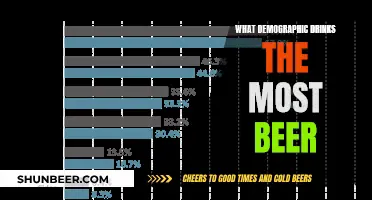
Alcoholic drinks are high in calories and can cause weight gain in several ways. Firstly, alcohol is calorific and can increase your overall calorie intake. Secondly, drinking alcohol can make you feel hungrier and lead to poor food choices. Thirdly, alcohol can prevent your body from burning fat. Finally, alcohol can increase your cravings for salty and greasy foods.
However, the relationship between alcohol consumption and weight gain is complex and depends on many factors, including what and how much you drink, how often you drink, your unique body and lifestyle, and your level of physical activity.
While light-to-moderate alcohol consumption may not cause weight gain, regular heavy drinking is more consistently linked to weight gain.
| Characteristics | Values |
|---|---|
| Calories | Beer contains calories, with regular beer containing around 150 calories per 12-ounce glass, light beer containing around 100 calories per 12-ounce glass, and craft beer containing between 170 and 350 calories per 12-ounce glass. |
| Empty calories | Alcoholic drinks contain empty calories, meaning they provide little to no beneficial nutrients or minerals. |
| Appetite | Alcohol may affect hormones that control appetite, causing an increase in hunger. |
| Food choices | Alcohol may lead to poor food choices and cravings for salty, greasy, and high-calorie foods. |
| Fat burning | Alcohol may prevent your body from burning fat as your body prioritises breaking down alcohol over other sources of fuel. |
| Phytoestrogens | Beer contains phytoestrogens, which may increase the risk of storing belly fat, particularly in men. |
| Sleep | Excess alcohol use has been linked to poor sleep quality and duration, which may in turn contribute to weight gain. |
What You'll Learn

Beer is high in calories and can increase your appetite
Beer is high in calories, with a 12-ounce (355 mL) glass of regular beer containing about 150 calories, and a higher alcohol content leading to more calories. A gram of alcohol provides 7.1 kcal (29 kJ), and the energy consumed from alcohol is additive to that from other dietary sources. This means that drinking beer can increase your overall calorie intake, potentially leading to weight gain.
In addition to its high-calorie content, beer can also increase your appetite. Studies have shown that drinking alcohol can increase your appetite in the short term, causing you to eat more than you otherwise would. This is because alcohol can affect hormones that control appetite and hunger. For example, alcohol can influence hormones like leptin, glucagon-like peptide-1 (GLP-1), and cortisol, which are involved in regulating energy intake and metabolism. Alcohol can also reduce your blood sugar level, which may further increase your hunger and cravings for high-carb or high-calorie foods.
Therefore, drinking beer can contribute a significant number of calories to your diet and increase your appetite, making it more likely that you will consume more calories overall. This can ultimately lead to weight gain, especially if you are not compensating for the extra calories by reducing your food intake or increasing your physical activity.
Non-Alcoholic Beer: Safe, Sensible, and Socially Acceptable?
You may want to see also

Alcohol stops your body from burning fat
Alcohol is high in calories and can increase your appetite, causing you to eat more than you usually would. It can also lead to cravings for salty and greasy foods. The more you drink, the higher your risk of weight gain.
Heavy drinking may also affect your hormones, causing weight gain. It can impair the functions of your glands, which release hormones that aid in your body's stress response and help control your energy and metabolism. For example, heavy drinking may cause your adrenal glands to secrete higher levels of cortisol, a stress hormone, which can increase abdominal weight gain and cravings for high-calorie foods.
Alcohol is also likely to increase abdominal fat. Instead of being burned as energy, a small percentage of the calories from alcohol are stored as fat near your midsection.
However, it is important to note that the relationship between alcohol consumption and weight gain is complex and depends on various factors. These include what you drink, how much you drink, how often you drink, your unique body and lifestyle, and your level of physical activity.
Beer Consumption and Nephritis: What's the Safe Limit?
You may want to see also

It can lead to unhealthy food choices
Alcohol can lead to unhealthy food choices in several ways. Firstly, alcohol can increase your appetite in the short term, causing you to eat more than you otherwise would. Studies have shown that people don't always compensate for the calories they consume from alcohol by eating less of other foods. Alcohol can also impair the functions of your glands that release hormones, which may cause weight gain. For example, heavy drinking may cause your adrenal glands not to regulate how much cortisol they secrete, leading to high cortisol levels and an increase in abdominal weight gain. Cortisol redistributes fat tissue to your abdominal region and increases cravings for high-calorie foods. Alcohol can also reduce your blood sugar level, which may increase hunger and cause people to seek high-carb foods to satisfy their cravings.
Beer and Medication: Is it Safe to Drink with GL?
You may want to see also

It can cause hormonal changes that increase the risk of storing belly fat
Alcoholic drinks are high in calories and can cause weight gain in several ways. One of the ways is by causing hormonal changes that increase the risk of storing belly fat.
Drinking alcohol can impair the functions of glands that release hormones, which may cause weight gain. Generally, glands in the body release the right amount of hormones at the right time. These hormones aid in the body's stress response and help control energy and metabolism. For example, the adrenal glands, found on top of the kidneys, secrete cortisol, a stress hormone that usually helps the body respond to stress by increasing blood pressure and heart rate.
Some evidence suggests that heavy drinking may cause the adrenal glands not to regulate how much cortisol they secrete. As a result, people who drink heavily may have high cortisol levels, which increase abdominal weight gain. Cortisol redistributes fat tissue to the abdominal region and increases cravings for high-calorie foods.
Another hormone that is affected by alcohol consumption is leptin. Leptin is a hormone that plays an important role in regulating energy balance and weight. Alcohol inhibits the effects of leptin, which can lead to an increase in appetite and food intake.
In addition to affecting hormone levels, alcohol can also increase the number of calories consumed. Gram for gram, beer contains as many calories as a soft drink, so it can add a significant number of calories to your diet. Alcohol can also increase your appetite and lead to poor food choices, resulting in excess calorie consumption.
Overall, while there are several ways that alcohol can contribute to weight gain, the relationship between alcohol consumption and obesity is complex and influenced by various factors. However, heavy drinking and binge drinking have been more consistently linked to weight gain, especially around the belly area.
Pregnant Women and NA Beer: What's the Verdict?
You may want to see also

Alcohol is linked to other serious health risks
- High blood pressure: Alcohol consumption can lead to an increase in blood pressure, which can have detrimental effects on cardiovascular health.
- High triglycerides: Drinking alcohol, especially in excessive amounts, can cause a rise in triglyceride levels, a type of fat in the blood, which is a risk factor for heart disease.
- Insulin resistance: Alcohol can interfere with the body's ability to use insulin effectively, leading to insulin resistance and potentially increasing the risk of type 2 diabetes.
- Heart disease: The high calorie content of alcohol, particularly when consumed in excess, can contribute to weight gain and increase the risk of heart disease.
- Stroke: Excessive alcohol intake is a risk factor for stroke, as it can lead to high blood pressure, irregular heart rhythms, and damage to the heart muscle.
- Liver disease: Alcoholic liver disease can develop from long-term, heavy drinking, causing inflammation and scarring of the liver, and potentially leading to cirrhosis and liver failure.
- Cancer: Drinking alcohol is associated with an increased risk of certain types of cancer, including cancers of the mouth, throat, liver, and breast.
Rats and Beer: Is It Safe for Rats to Drink?
You may want to see also
Frequently asked questions
Drinking beer can cause weight gain, but it depends on how much you drink and how often. Heavy drinking is more consistently related to weight gain. Beer is high in calories and can prevent your body from burning fat.
Beer is high in calories, with a 12-ounce (355 mL) glass of regular beer containing about 150 calories. Beer also prevents your body from burning fat as your body prioritises breaking down alcohol.
If you are trying to lose weight, you can boost your efforts by cutting back on beer and other alcoholic drinks. You can still drink in moderation, but ensure you eat a meal before drinking and keep track of how many drinks you are consuming.







